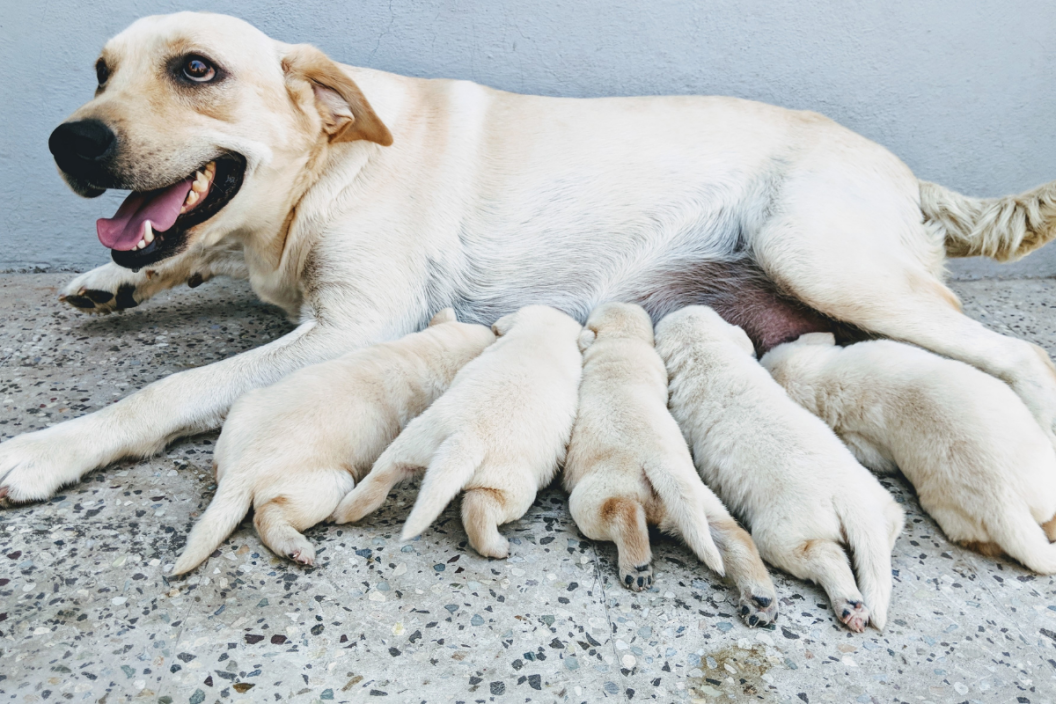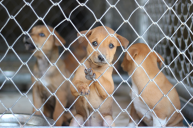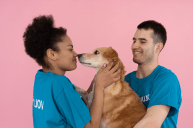Ever wonder how purebred dog breeders plan and have litters?
Responsible breeders stick to tried and true dog breeding practices to produce the best companion dogs for prospective families. Their pups are treated as part of the family, and many of them spend years researching pups and their breed's most recognizable traits to bring out the best qualities in the dogs. As a result, dog owners benefit from increased breed standards from quality breeding programs that produce excellent companion animals. But what exactly does this process look like?
Types of Breeding
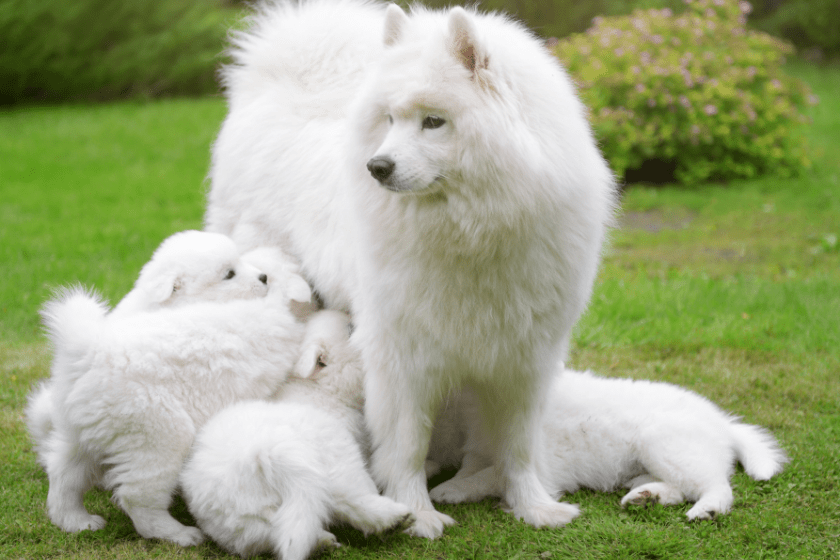
For starters, there are a few different types of breeding: inbreeding, linebreeding, and outbreeding. However, only two types are used by what would be considered responsible dog breeders: Inbreeding is breeding within a dog's first relatives, meaning a parent and offspring, and siblings; according to the American Kennel Club, linebreeding is when two dogs are closely related but not first relatives are bred together. The AKC says breeders should use linebreeding to "solidify traits in your bloodline."
Outbreeding is mating two dogs who are not within the same bloodline. However, the AKC cites that outbreeding "removes the differences between dogs and thus reduces the ability to select for individual traits."
When breeding dogs, most breeders practice selective breeding to create healthy, quality dogs while maintaining genetic diversity in their pups. Breeders try to breed out genetic defects like hip dysplasia and other common health problems. While they can guarantee some things with health testing, they cannot guarantee that your dog will stay healthy forever since some health problems pop up as a dog gets older, no matter their genetics. The health of the parents is only part of the equation. Most breeders delve deeper into canine genetics and have information about the grandparent dogs as well, which gives potential buyers a better picture of the pup's lineage.
Ethical Dog Breeding

RELATED: Puppy Protection Act: Fighting for Better Breeding Conditions
Ethical breeding of dogs is not a casual venture. It is quite the commitment and can be very expensive, which is why quality AKC registered puppies tend to cost so much. A month before breeding, the dogs will both go through a health check from a veterinarian to ensure they are healthy enough to carry a litter. The AKC requirements are that a litter cannot be registered if the dam is younger than eight months or older than 12, and the sire is younger than seven months or older than 12. It's important to note that a female dog should not be bred in her first season — Generally, it is best to wait until the female dog is over a year old to ensure she can handle taking care of the litter, and the pregnancy won't cause her harm. If a traditional "tie" does not work, a breeder will use artificial insemination, which is often used for crossbreeding different size dog breeds.
A female dog's pregnancy typically lasts somewhere between 58-68 days, but the exact length depends on the individual dog and litter size. Dogs like German Shepherds can have between 1 to 15 puppies, with the average being eight. A larger litter will come earlier, while a smaller litter may push closer to the pup's due date. Smaller breeds like Bulldogs have, on average, four puppies and generally need the assistance of a veterinarian for delivery since their newborns are often delivered via C-section.
Female dogs can have up to three litters per year. However, that is not always what is legal or best for the momma dog. Many ethical and responsible breeders only produce one litter per year and stop breeding once their pups reach the AKC recommended age limit. Of course, the age to stop breeding is breed-specific.
The best and most ethical breeders care for the mom and her offspring from the very beginning through the puppies' first few months of life. An ethical breeder will ensure that they are fed quality food, bathed, socialized, and have their first set of vaccinations and proper veterinary care long before they go home to their new families. Socialization is an important part of raising the pups, as a dog who is not socialized may not do as well in their new home. Breeders may also require that the new families spay or neuter the pups when they are old enough to prevent unwanted litters. Again, most reputable breeders will check in to ensure this is done.
However, if the new family expresses an interest in breeding pedigree dogs, there may be a fee on top of the adoption regular price. For example, our breeder charges an extra $500 for breeding rights with his AKC registered pups. In addition, other breeders may not want to risk mutations to their bloodlines and may not allow the pups to be bred.
Common Breeding Misconceptions
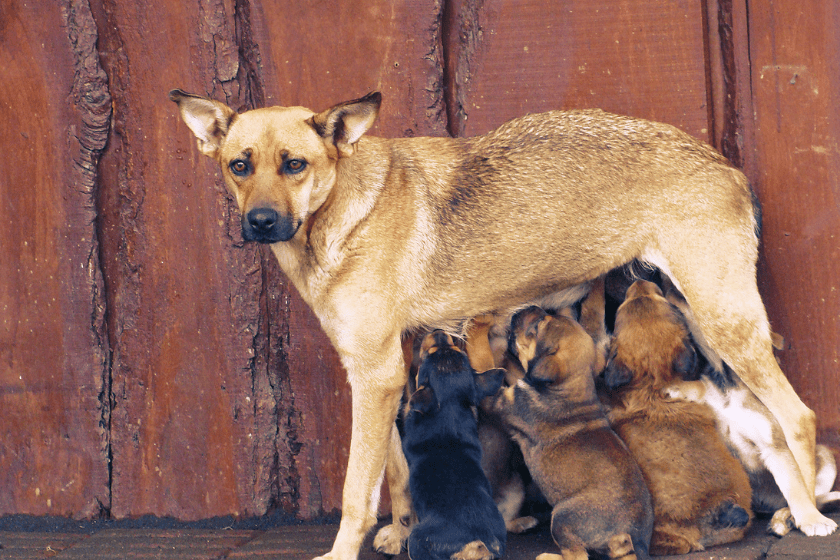
There are many different breeding misconceptions from how to predict litter size to dog life span if they are bred. A few of them include:
There is no difference between backyard breeders and responsible breeders.
Many people think dog breeders and backyard breeders are one and the same. However, the two could not be more different. Backyard breeders often have accidental litters that are mixed breeds. They are not bred intentionally and cannot tell you much about the dog's history. Whereas responsible breeders know their dog's history and lineage and can answer questions you may have about the breed itself. If you are looking for a breeder, you can talk to your local breed clubs or visit a dog show.
Dog's nipples predict litter size.
There is no correlation between how many nipples a female dog has and the size of her litter. The number of nipples directly correlates to the dog's size, which is generally 8-10.
Breeding shortens the dog's lifespan.
There is no evidence to support the theory that breeding a dog shortens its lifespan. Unless, of course, unethical procedures are used and something happens to the dog during delivery.
Have you bred puppies? Tell us on our Wide Open Pets Facebook page.
